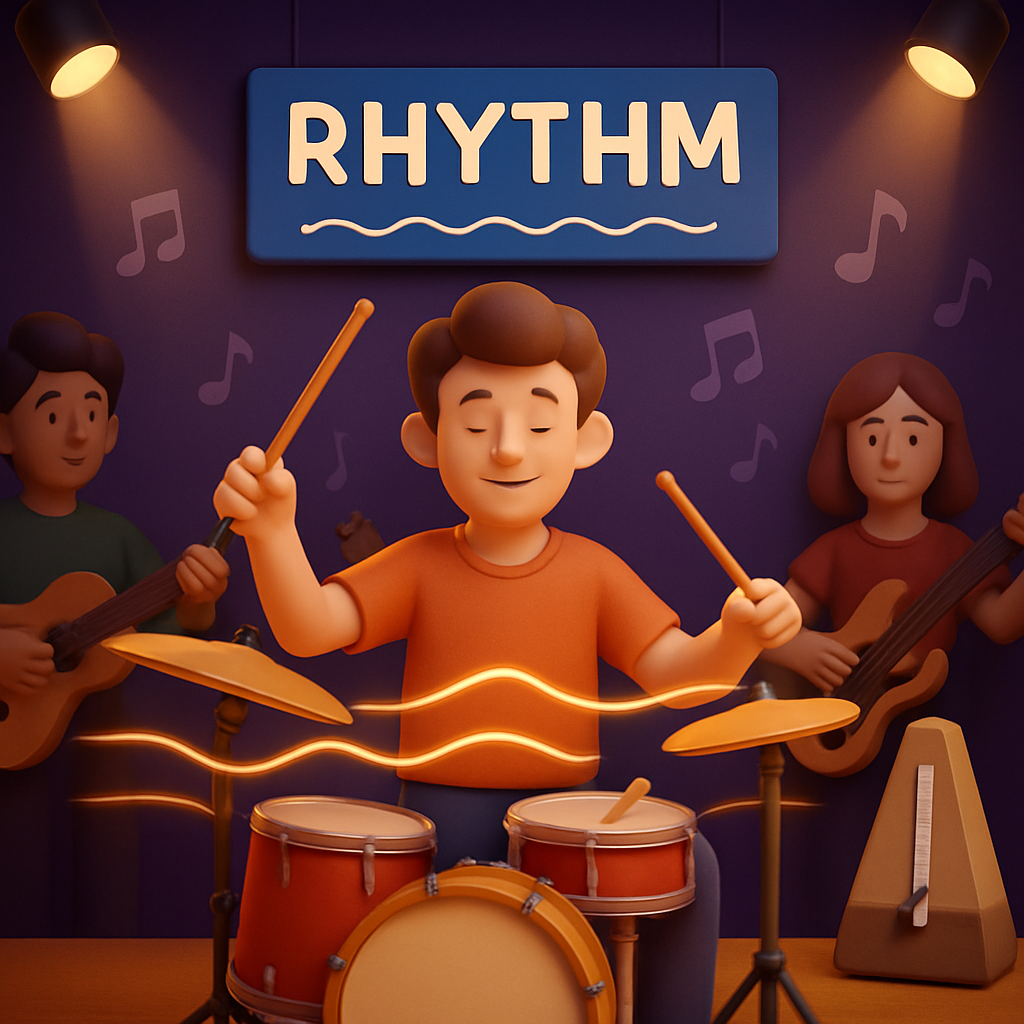Rhythm
Definition
The term "rhythm" refers to a regular, repeated pattern of movement, sound, or activity, often involving a sense of timing or flow.
Parts of Speech
- Noun
Pronunciation
American English
- IPA Pronunciation: /ˈrɪð.əm/
- Respelling: RITH-uhm
British English
- IPA Pronunciation: /ˈrɪð.əm/
- Respelling: RITH-uhm
Etymology
The word "rhythm" originates from the Greek "rhythmos," meaning "measured motion or flow," derived from "rhein," meaning "to flow." It entered the English language through Latin and Old French in the late Middle Ages.
Derivatives
- Rhythmic (adjective)
- Rhythmical (adjective)
- Rhythmically (adverb)
- Arrhythmic (adjective)
- Rhythmist (noun)
Synonyms
- Beat
- Cadence
- Flow
Antonyms
- Irregularity
- Discord
- None
Usage
The term "rhythm" is commonly used in music, poetry, and movement to describe a pattern or flow. For example, "The song has a fast rhythm," or "The rhythm of her speech captivated the audience."
Related Terms
- Tempo: The speed of a musical composition.
- Meter: The structured pattern of beats in poetry or music.
- Pulse: The regular beat or throb in music or motion.
Detailed Definitions
Noun
- A strong, regular, repeated pattern of sound or movement: Refers to a consistent and often predictable sequence that can be sensed through hearing or motion, commonly found in music and dance.
- Example: "The drummer kept a steady rhythm throughout the performance."
- The systematic arrangement of musical sounds according to duration and stress: Describes how beats, notes, and silences are organized in time to form a structured musical pattern.
- Example: "Jazz often features complex rhythms."
- A harmonious sequence or flow of actions or processes: Refers to the natural or intentional pacing and order in which events, tasks, or movements occur, creating a sense of balance or continuity.
- Example: "The rhythm of the tides is influenced by the moon."
rhythm



🇨🇳 Chinese (Mandarin)
- 节奏 (jiézòu) - rhythm in music
- IPA: /tɕjě.tsôu/
- Respelling: jye-tzou
- 节律 (jiélǜ) - regulated pattern
- IPA: /tɕjě.lỳ/
- Respelling: jye-lu
🇮🇳 Hindi
- लय (laya) - rhythm in music
- IPA: /lə.jaː/
- Respelling: la-ya
- ताल (tāla) - regulated pattern
- IPA: /taːl/
- Respelling: taal
🇪🇸 Spanish
- Ritmo - rhythm in music
- IPA: /ˈrit.mo/
- Respelling: rit-mo
- Patrón - regulated pattern
- IPA: /paˈtɾon/
- Respelling: pa-tron
🇫🇷 French
- Rythme - rhythm in music
- IPA: /ʁit.m(ə)/
- Respelling: ritme
- Modèle - regulated pattern
- IPA: /mɔ.dɛl/
- Respelling: mo-del
🇸🇦 Arabic (Modern Standard Arabic)
- إيقاع (iqa) - rhythm in music
- IPA: /ʔiːqaːʕ/
- Respelling: ee-qa-a
- نمط (namt) - regulated pattern
- IPA: /namtˤ/
- Respelling: namt
🇧🇩 Bengali
- তাল (tāl) - rhythm in music
- IPA: /t̪al/
- Respelling: taal
- নিয়মিত প্যাটার্ন (niẏamita pyāṭārṇa) - regulated pattern
- IPA: /ɲɔmita pjaʈarn/
- Respelling: niyo-mita pya-tarn
🇷🇺 Russian
- Ритм (ritm) - rhythm in music
- IPA: /rʲit.m/
- Respelling: rit-m
- Образец (obrazets) - regulated pattern
- IPA: /ɐˈbra.zʲɪts/
- Respelling: o-bra-zits
🇵🇹 Portuguese
- Ritmo - rhythm in music
- IPA: /ˈʁit.mu/
- Respelling: riht-moo
- Padrão - regulated pattern
- IPA: /pɐ.ˈdɾɐ̃w̃/
- Respelling: pa-draon
🇮🇩 Indonesian
- Irama - rhythm in music
- IPA: /ira.ma/
- Respelling: i-ra-ma
- Pola - regulated pattern
- IPA: /po.la/
- Respelling: po-la
🇩🇪 German
- Rhythmus - rhythm in music
- IPA: /ˈʁʏt.mʊs/
- Respelling: ryth-mus
- Muster - regulated pattern
- IPA: /ˈmʊstɐ/
- Respelling: mus-ter
🇯🇵 Japanese
- リズム (rizumu) - rhythm in music
- IPA: /ɾʲizɯ̟ᵝmɯ̟ᵝ/
- Respelling: ri-zu-mu
- パターン (patān) - regulated pattern
- IPA: /pa̠ta̠ːɴ/
- Respelling: pa-ta-n
🇻🇳 Vietnamese
- Nhịp điệu - rhythm in music
- IPA: /ɲɪp ɗiə̯w/
- Respelling: nyip di-eu
- Mô hình - regulated pattern
- IPA: /mɔ˧ˀ˨ʔ hiŋ˨˩/
- Respelling: mo hin
🇰🇷 Korean
- 리듬 (rideum) - rhythm in music
- IPA: /ɾi.dʌm/
- Respelling: ri-deum
- 패턴 (paeteon) - regulated pattern
- IPA: /pʰɛ.tʌn/
- Respelling: pe-teon
🇹🇷 Turkish
- Ritim - rhythm in music
- IPA: /ɾiˈtim/
- Respelling: ri-tim
- Düzen - regulated pattern
- IPA: /dyˈzen/
- Respelling: du-zen
🇵🇰 Urdu
- رقص (raqs) - rhythm in music
- IPA: /rəq̪s/
- Respelling: raqs
- نمونہ (namuna) - regulated pattern
- IPA: /nə.muː.nə/
- Respelling: na-mu-na





